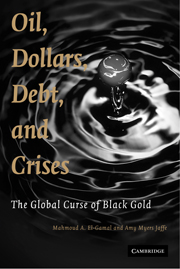Book contents
- Frontmatter
- Contents
- List of Illustrations
- List of Tables
- Foreword
- Preface
- 1 The Challenges of Resource Curses and Globalization
- 2 New Middle East: Childhood 1973–84 and Adolescence 1985–95
- 3 Road to the Status Quo: 1996–2008
- 4 Globalization of Middle-East Dynamics
- 5 Dollars and Debt: The End of the Dollar Era?
- 6 Motivations to Attack or Abandon the Dollar
- 7 Resource Curses, Global Volatility, and Crises
- 8 Ameliorating the Cycle
- Conclusion
- Notes
- Bibliography
- Index
8 - Ameliorating the Cycle
Published online by Cambridge University Press: 05 June 2012
- Frontmatter
- Contents
- List of Illustrations
- List of Tables
- Foreword
- Preface
- 1 The Challenges of Resource Curses and Globalization
- 2 New Middle East: Childhood 1973–84 and Adolescence 1985–95
- 3 Road to the Status Quo: 1996–2008
- 4 Globalization of Middle-East Dynamics
- 5 Dollars and Debt: The End of the Dollar Era?
- 6 Motivations to Attack or Abandon the Dollar
- 7 Resource Curses, Global Volatility, and Crises
- 8 Ameliorating the Cycle
- Conclusion
- Notes
- Bibliography
- Index
Summary
During the four decades covered in this book, we have witnessed two full phases of the cycle. We began writing this book (and rewriting various chapters, as the pace of change accelerated) in late 2006, when we noticed that the surge in petrodollars was left out of the Bretton Woods II sustainability debate. As it turns out, the crash of 2008–9 did not usher in the end of that system, in large part because U.S. creditors have recognized the “balance of financial terrors” problem and therefore have continued to invest substantially in Dollar-denominated assets, albeit more nervously and more vocally about that nervousness. In other words, cooperation and coordination of investment policies have allowed the international financial system to remain intact through its latest crisis.
Moreover, although signs of increasing protectionism have been evident, including among G20 countries that have repeatedly warned against it, the early signs suggest that 1930s-style collapse of international trade and finance is unlikely: A recent World Bank Trade Note warned that despite signing a pact in November 2008 to avoid protectionism, seventeen out of the G20 countries had in fact implemented some protectionist policies, forty-seven in all, by March 2009.
The World Bank note suggested steps that should be taken by the World Trade Organization (WTO) and G20 to avoid further escalation of protectionist policies worldwide. So far, despite significant reduction in global trade because of the severe global recession, and despite the isolated incidents discussed in this World Bank note, cooperation and coordination, including protection of a relatively strong Dollar, have prevented, the death of globalization empowered by trade and foreign direct investment.
- Type
- Chapter
- Information
- Oil, Dollars, Debt, and CrisesThe Global Curse of Black Gold, pp. 171 - 190Publisher: Cambridge University PressPrint publication year: 2009



